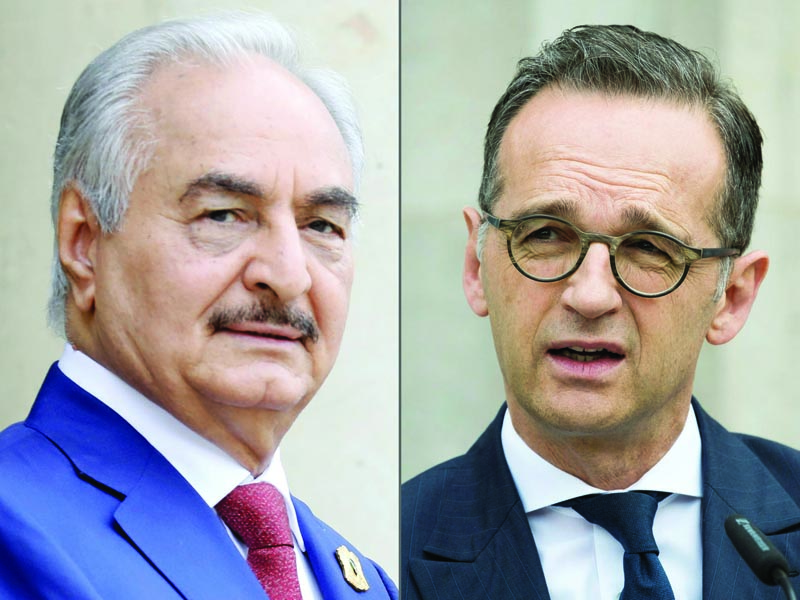

CAIRO/BRUSSELS: After war broke out again in Libya early last year, a special team of EU diplomats in Tripoli was forced back to neighbouring Tunisia to do what they had been doing for several years: wait. As Germany holds a UN summit on Sunday for a path to end the conflict in Libya, in turmoil since the 2011 fall of Muammar Gaddafi, European powers believe they can now begin to overcome such inaction and defend interests on their southern doorstep.
But like the bored EU experts tasked with supporting Libyan ministry officers at their temporary mission offices in Tunis over the past five years, EU diplomacy has often arrived too late to make an impact and, in Iran, been left exposed by US President Donald Trump's "America First" policy. "We Europeans, since we don't want to participate in a military solution, we barricade ourselves in the belief there is no military solution," the EU's new foreign policy chief Josep Borrell told the European Parliament this week.
"Nobody will be very happy if, on the Libyan coast, there is a ring of military bases from the Russian and Turkish navies in front of the Italian coast," he said. The economically powerful EU, once able to boast of a soft power that helped transform communist neighbours into thriving market economies, first sent a mission to Libya to train border guards in 2013 but was reduced to running all its training outside of Libya from 2015, returning briefly in 2017 and 2019.
With Libya's migration routes close to European shores and its energy supplies in the Mediterranean sought by Turkey, policy towards a country that was an EU priority has instead become a symbol of its divisions. Former colonial power Italy has supported the Tripoli-based, UN-backed government of Fayez al-Serraj, while France favoured Khalifa Haftar, commander of the eastern Libyan National Army.
Paris and Rome held rival peace conferences, while Russia and Turkey, two countries sometimes at odds with the EU's values of democracy and human rights, sidelined the bloc. First talks on a ceasefire last week took place in Moscow, not Brussels. Washington, Europe's closest ally, has been largely absent, a far cry from 2011 when the United States and Europe cooperated under NATO in a bombing campaign that backed the rebels who overthrew Gaddafi.
"In the Middle East and North Africa, the EU never had a clear idea of what its objectives are, so it could not be proactive, only reactive. We have let many opportunities pass," said Sven Biscop, an analyst at Belgium's Egmont Institute. The EU, facing a crisis in Iran over the unravelling of the 2015 nuclear deal, now senses an opportunity in Libya after Moscow failed to reach a ceasefire deal with Haftar. Shock over the fallout from U.S. drone strike on an Iranian general on Jan. 3 has galvanized Europeans over Libya, some EU envoys say, settling on a new
"European approach".
Britain, France and Germany already this week showed a new determination to pressure Tehran to comply with the Iran accord, triggering a dispute mechanism that could lead to the reimposition of U.N. sanctions. However, with Sunday's conference on Libya approaching, Italy and France have yet to put aside their differences and rally behind the government in Tripoli.
Germany, which sees itself as more neutral than France and Italy, has sought to take the lead, with German Chancellor Angela Merkel investing time in seeking the support from her Russian, Turkish and Egyptian counterparts. The EU's new leadership in Brussels also wants to be more "geopolitical" and stem the waning of Europe's influence. It launched into a frenzy of diplomacy in early January amid fears of a Middle East conflagration after the U.S. drone strike in Iran.
Top EU officials held talks with Serraj in Brussels, called an emergency meeting of EU foreign ministers, held calls with Iran's president and joined French President Emmanuel Macron at a conference on the Sahel. "We are not trying to have an aggressive external policy … but the heads of state need a new mindset to be more assertive," said a senior EU official involved in foreign policy.
Friendly foreign governments do want to see the European Union succeed in the world, officials and diplomats said. Venezuelan opposition leader Juan Guaido has regularly called for EU help to increase pressure on President Nicolas Maduro. Since Trump withdrew from the Iran nuclear accord and reimposed U.S. sanctions, Tehran has repeatedly called on the EU to save a nuclear deal by keeping trade channels open.
But with Britain, one of Europe's two main military powers with France, leaving the European Union, the EU could find it hard to live up to its ambitions. Neither the EU nor NATO have plans to deploy troops in Libya. The EU naval operation, Sofia, which rescued migrants off the Libyan coast and helped enforce an arms embargo, has been taken off the water, and European allies have rejected US calls at NATO to help patrol Gulf shipping lanes. Sometimes just agreeing statements has proved too divisive. "The positive sign is that everyone now agrees this is unsustainable," said Bruno Macaes, a former Europe minister for Portugal and now a foreign policy consultant. - Reuters

